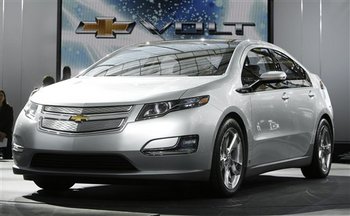Michigan's advanced manufacturing base is well suited to handle battery challenges
The emotional impact of the contraction of Michigan’s traditional manufacturing base is softened only by encouraging signs that our advanced manufacturing sector is surviving.
The painful erosion of Michigan’s traditional manufacturing sector has exposed the homogeneous complexion of our state’s economy, serving as a constant reminder of the consequences of our failure to diversify years ago.
But the erosive contraction has also revealed one of the state’s greatest strengths - its advanced manufacturing core.
It’s critical that we preserve our advanced manufacturing base, which now includes more than 381,000 workers at 11,000 companies, representing two-thirds of Michigan’s manufacturing sector, according to a new report the Anderson Economic Group conducted for the University Research Corridor.
The state stands to reap enormous benefits from future investments in advanced manufacturing, too. A perfect example is lithium-ion batteries for electric vehicles.
Michigan is set to become a world leader in research and production of electric vehicle batteries. Korean firm LG Chem and Johnson Controls-Saft are building plants in Holland, Dow Chemical is leading a partnership to build a plant in Midland, and the major automakers are investing heavily to develop their own battery capacity.
But simply building plants won’t be enough to ensure massive job growth for the state. For one, what if consumers don’t embrace electric cars? What if China beats us to the punch?
The emerging supply chain for electric vehicle batteries - which includes raw material refining, cell production and battery pack assembly - is still in its early stages, and foreign companies, particularly in China, are positioning themselves to seize the market, too.
Engineers and scientists are racing to reduce the cost of electric vehicle batteries and improve the reliability and durability.
Today’s high cost of lithium-ion batteries for electric vehicles is becoming more obvious to consumers.

GM is working feverishly to lower the cost of the battery for the Chevrolet Volt.
But making vehicles like the Volt affordable is a challenge that Michigan’s advanced manufacturing workforce is well suited to tackle.
“The battery cost is going to come down very significantly,” said David Cole, chairman of Ann Arbor-based Center for Automotive Research. “The question is how soon.”
Experts disagree about when electric vehicles will become affordable. Right now the cost of producing a lithium-ion battery for an electric vehicle is estimated at between $1,000 per kilowatt hour and $1,250 per kilowatt hour, according to the Boston Consulting Group. The Volt’s battery generates 16 kilowatts per hour - the electric vehicle’s version of the internal combustion engine’s horsepower.
The U.S. Department of Energy last month projected the price of electric vehicle batteries would drop 70 percent by 2015. The Boston Consulting Group, however, said it foresees “substantial challenges” in driving costs down to the industry’s goal of $250 per kilowatt hour within 10 years.
Cole said he does not believe it will take 10 years for GM to reduce cost of the Volt’s battery significantly.
“I don’t think it’s that far away,” he said. “It’s not next year, but in the next three or four years I think we’re going to see a pretty dramatic reduction in cost.”
Michigan’s emerging advanced battery sector is well positioned to generate the technology advancements and production efficiencies to make cars like the Volt accessible for the ordinary consumer.
Some experts believe that China, Korea and Japan have an edge because they’ve been making lithium-ion batteries for small electronics for decades.
Cole is not convinced, because nobody has yet mass-produced lithium-ion batteries for vehicles.
“That capacity doesn’t exist anywhere in the world. So we’ve got a shot at being the battery center here. That’s the plan, and I think it’s the right plan,” he said. “If anybody thinks we’re going to have tens of thousands of jobs right away, that’s not going to happen. But as the battery becomes economical, as the production expands, those battery jobs are going to be good jobs, and it’s important to have those jobs here.”
Contact AnnArbor.com's Nathan Bomey at (734) 623-2587 or nathanbomey@annarbor.com. You can also follow him on Twitter or subscribe to AnnArbor.com's newsletters.


Comments
Basic Bob
Sun, Aug 1, 2010 : 11:24 a.m.
runbum03, Anderson wrote the report for the University Research Corridor. I'm sure they had access to the funding data and loads of PhD's. If it was written by a technical writer rather than an economist it can still be valid as long as the report is reviewed by experts. Sorry you are so impatient for the results, but there will be no results without a market for the products at a reasonable cost. Investment is necessary in developing the manufacturing process. No reason that we shouldn't use the existing resources of our universities to develop the technology for the private sector.
runbum03
Sun, Aug 1, 2010 : 6:16 a.m.
Nice "spin." The Anderson Report, not written by anyone with a Ph.D nor a background in economics, touted $1/2 Billion of research money is funneled through Michigan schools. That's the gist of it. Lot's of spending. Not much to show. It was not a good read.